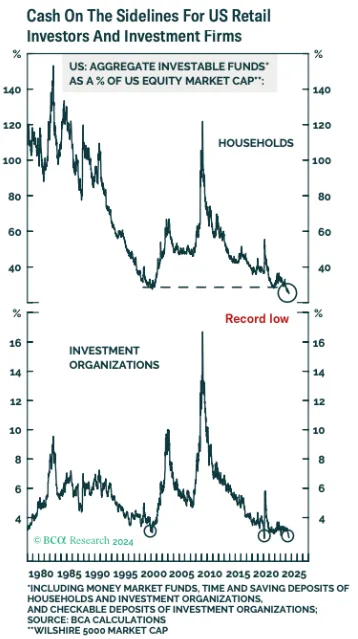U.S. stocks have frequently reached record highs this year. However, against the backdrop of mixed earnings reports from large technology stocks, U.S. stocks fell into violent shocks last week. The S&P 500 index fell 1.55% in a single week, and the Nasdaq index, which is dominated by technology stocks, fell. 3.38%, the Dow Jones Industrial Average rose slightly by 0.73%, and the Philadelphia Semiconductor Index fell by 5.42%.
At the same time, a research team led by Arthur Budaghyan, chief emerging market strategist of BCA Research, a Canadian research institution, recently issued a report titled "Little Cash On The Sidelines" warning that U.S. stocks will soon peak. , the bear market is about to begin.
The reason of the BCA Research research team is that the OTC cash of U.S. retail investors and investment companies has fallen to a record low as a proportion of the market capitalization of the U.S. stock market, indicating a "lack of firepower" and limited funds flowing into securities markets such as stocks and government bonds.

Therefore, Arthur Budaghyan predicts that the U.S. stock market will soon peak and a bear market is about to begin. He suggests that global asset allocators should increase their holdings of government bonds instead of stocks. In addition, it is necessary to appropriately allocate some US dollar cash.
Regarding the situation of over-the-counter cash, Arthur Budaghyan explained that in absolute terms, the total scale of investable funds is still large, but it has stagnated as the Federal Reserve reduces its asset holdings. In addition, due to the quantitative tightening of the US Federal Reserve The policy reduces the money supply, and the scale of investable funds decreases accordingly. Due to the low proportion of investable funds and the overvaluation of U.S. stocks, this may become a turning point in this AI-driven stock market rally.
On the other hand, Budaghyan added that the record share buyback programs of technology giants such as Apple, Microsoft, Alphabet, and Nvidia are the main factors that enable them to maintain high valuations. For example, Apple’s When the second quarter 2024 financial report was released in May, it announced the launch of the largest stock repurchase plan in history of US$110 billion, accounting for 10% of all repurchase plans this year.
Huida shares have soared sevenfold since the launch of ChatGPT in late 2022, helping to drive a surge in global markets dominated by large-cap stocks, but concerns about the sustainability of AI business earnings, as well as geopolitical tensions and changes in global monetary policy , is pushing the market to find new drivers, and investors appear to be selling off AI technology stocks and snapping up small-cap and defensive stocks.
The biggest bubble in history?
Previously, Mark Spitznagel, the founder of the well-known black swan fund Universa, warned earlier this month that the U.S. stock market is in the "biggest bubble in human history" and will usher in the last carnival. Once the Federal Reserve cuts interest rates, the market trend may reverse and massive selling will occur. Pressure will follow, and most of the value of the U.S. stock market will evaporate.
Mark Spitznagel pointed out that the slowdown in inflation and the prospect of an interest rate cut by the Federal Reserve have pushed investors to be bullish, but an interest rate cut is often a signal of a major reversal in market conditions. The future decline of U.S. stocks will be more serious than that of 25 years ago. This is "the first time in human history." "The Biggest Bubble", with high public debt and valuations making Washington's bailout efforts more difficult to implement, and he asserted that inflation will slow too much and the U.S. economy may enter a recession before the end of the year.








